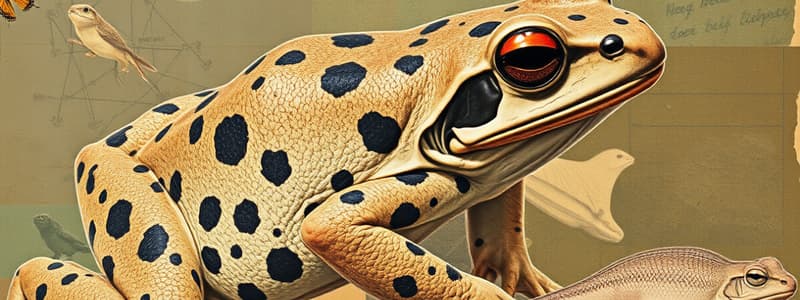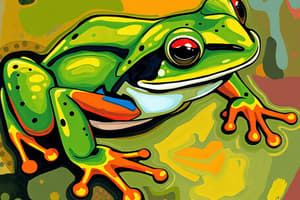Podcast
Questions and Answers
What does Bufonidae refer to?
What does Bufonidae refer to?
- Spadefoots
- Tree Frogs
- True Toads (correct)
- True Frogs
What are the characteristics of Hylidae?
What are the characteristics of Hylidae?
Elongate toes, little or no webbing, enlarged adhesive toe pads.
Which family of frogs is characterized by smooth skin and webbed feet?
Which family of frogs is characterized by smooth skin and webbed feet?
- Hylidae
- Dendrobatidae
- Bufonidae
- Ranidae (correct)
What is a characteristic of Scaphiopodidae?
What is a characteristic of Scaphiopodidae?
Match the following families with their characteristics:
Match the following families with their characteristics:
What are the features of Mantellidae frogs?
What are the features of Mantellidae frogs?
What defines Microhylidae?
What defines Microhylidae?
Pyxicephalidae are only found in Africa and males are larger than females.
Pyxicephalidae are only found in Africa and males are larger than females.
The __________ frog has a large mouth and horns.
The __________ frog has a large mouth and horns.
Flashcards are hidden until you start studying
Study Notes
Bufonidae - True Toads
- Characterized by warty skin and relatively short hind limbs.
- Possess toxin-producing glands, lacking bright warning colors.
Hylidae - Tree Frogs
- Features elongated toes with little to no webbing.
- Equipped with enlarged adhesive toe pads for climbing.
Ranidae - True Frogs
- Smooth skin and large, strong legs are distinguishing traits.
- Possess webbed feet, aiding in swimming and movement in aquatic environments.
Scaphiopodidae - Spadefoots
- Fossorial lifestyle, primarily living underground.
- Metamorphosis can accelerate in low water conditions.
- Found in North America, noted for large eyes and vertical pupils.
- Have a keratinized spade on hind feet for burrowing.
Pipidae - Tongueless Frogs
- Possess webbed feet and may have claws on hind legs.
- Flattened body structure with splayed limbs.
- Notable for being tongueless, with larvae carried within the parents' skin.
Centrolenidae - Glass Frogs
- Eggs hatch and larvae drop directly into the water environment.
Leptodactylidae
- Many species in this family possess adhesive toe pads.
- Exhibit diverse developmental strategies, including both direct development and an aquatic larval stage.
Dendrobatidae - Poison Dart Frogs
- Known for their potency of batrachotoxin, which interferes with muscle function.
- Native to Central and South America, they are distinctive for their bright coloration.
Mantellidae - Malagasy Frogs
- Generally small and colorful, with some species featuring skin toxins.
Microhylidae - Narrow-mouthed Frogs
- Recognized for a small head and pointed snout.
- Adaptations for burrowing are common within this family.
Pyxicephalidae - Box-headed Frogs and African Bullfrogs
- Notable for having teeth on the upper jaw, a unique characteristic.
- Exclusively found in Africa, with males typically larger than females.
Ceratophryidae - Horned Frogs
- Characterized by a large mouth and horn-like structures.
- They also have short hind limbs, adapting them for their predatory lifestyle.
Studying That Suits You
Use AI to generate personalized quizzes and flashcards to suit your learning preferences.



